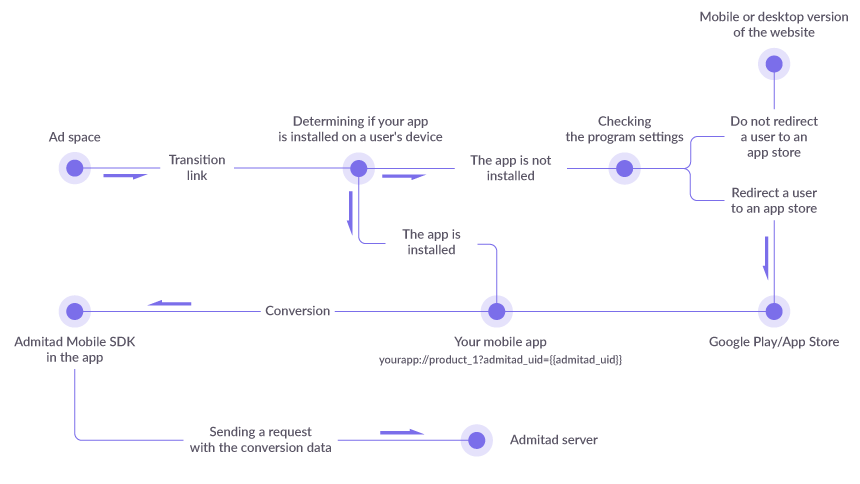SDK. What it is and how it works

We have already discussed how to launch an affiliate program of mobile application. In that article we have reviewed the tracking services, which advantages and disadvanеages they have and discussed which one it is better to choose. It is time to examine SDK Admitad — a new solution for the advertisers designed by Admitad taking into account the CPA marketing features.
According to eMarketer US customers have made 39,6% of online purchases using smartphones or tablets. And mobile commerce sales in the US are estimated to reach $270.4B in 2019. Following the eCommerce trends, more and more publishers start driving mobile traffic of high quality which switches to desktop, but not all advertisers know how to properly work with it and this issue is especially acute in affiliate networks. All this proves once again that mobile traffic is significant nowadays, and tracking of high quality is a must in 2019.
If you open the catalog of programs in Admitad and choose the category “Mobile offers”, you will see that not all advertisers pay for application installation. In many cases, advertisers are ready to reward for purchase in the application, for a registration, subscription (including trial), and other actions which are the results of installing the application. Even if a user clicked on the link but was redirected to the application where he/she made a purchase, the publisher should be rewarded. But many tracking solutions don’t provide the application owners with an opportunity to track these actions as they are aimed only at installations. Hence, publishers who drive traffic from mobile channels (social networks, messengers, mobile applications) refuse to work with such affiliate programs, and advertisers lose high-quality mobile traffic, and therefore profit.
Tracking issues in mobile applications
Tracking in mobile applications is often configured in a way that a purchase is attributed to the publisher who attracted the application installation (even if another publisher has motivated a user to make purchases in the app). This is usually due to the fact that some offers imply the payment for installations and due to “attribution windows” which we are going to discuss further. In this case, publishers who work with other models (CPS, CPR, and others) may not get the reward for driven sales.
In reality affiliate marketing in mobile applications works much harder. Apart from CPI (Cost per Install), affiliate networks work with such pricing models as CPS (Cost per Sale) and CPR (Cost per Registration). In the first case, a publisher gets the reward for a user who bought something in the app (it may include physical goods and virtual content — from goods in games to music subscriptions). In the latter case, a publisher focuses on driving leads — registrations of real users, which can be converted to sales in the future.
One more important point — «redirection» of users from the browser to app stores. For example, a potential customer uses the smartphone and clicks on the affiliate link of a publisher, and depending on the settings of the advertiser, the customer will proceed to the mobile version of the website or to the application in the store, where he/she will be able to continue shopping having installed the application. The user agrees, proceeds to the app store and downloads the application. Within several days this user returns to the application and makes the order. Here is where attribution and tracking issue occurs: who should get the reward if the app was installed via one affiliate link and the purchase was made via another one?
In the end, we face the need for an accurate scheme of tracking the user from the moment of the first click on an affiliate link to the moment of fulfilling KPI. Admitad has designed SDK in order to accurately track the actions of users in mobile applications. Let’s examine which advantages it has and how it can help publishers and advertisers in the affiliate network.
How does Admitad SDK work?
Below is the scheme which represents how the mobile tracking works:
Let’s examine each step in details, taking into account not only work of SDK but also the advertiser’s statistics which data is important when approving the target actions:
0. An advertiser joins the affiliate network, integrates tracking Admitad SKD in the mobile app, sets the advertising campaign and places a program in the catalog of affiliate programs. Publishers find the program and join it. Inside the app the advertiser marks the action of publishers so that the actions are sent to the affiliate network server via Admitad SDK. It also indicates where the traffic will go (to the app or on the website — mobile version or desktop) and what type of action is considered target (installs, sales, registration and so on).
1. A user visits a page of promotion where a publisher has placed an affiliate link. By the “page of promotion” we mean any ad space which a publisher uses to drive traffic to the advertiser: it can be a public page or a personal profile on social networks, channel on Telegram, blog, YouTube-channel, contextual or target ads and even other mobile apps.
2. The user likes the advertiser’s product/service and clicks on the link. Then there are two possible scenarios depending on if the app has already been installed on the smartphone of the user or not:
a. If the app has not been installed, Admitad checks the settings of the advertising campaign and directs the user in accordance with them. For example, if an advertiser doesn’t want to increase the number of installs, the user will be redirected to the mobile or desktop version of the website. And if a user performs an action there, it will be considered a target and the publisher will get paid. If an advertiser wants to increase the number of installations and actions in it, the user will be redirected to the relevant app store (Google Play or App Store). Having installed the app, the user opens it (it can be also tracked via SDK as target action). Important: Admitad tracks the user who clicked the link at each step and at each redirection in order to attribute the action to the relevant publisher.
b. If the app has already been installed, the system checks the settings of the campaign, and if the target action is an install, the publisher won’t get the reward. If the target action is activity in the application, the system keeps monitoring the user and then the next step.
3. The user opens the app and Admitad Mobile SDK monitors the behaviour. Apart from the app installs the advertiser can set tracking of other actions: user registration, making an order, order checkout, return to the application, app opening. In general, depending on the app settings, an advertiser can track almost any action as the events in SDK can be sent upon any trigger (for example, if a user has opened a target section). Not only these actions can be target (it means that publishers will get the reward for them in accordance with the rules of the program), they can also be accounted for KPI (we have explained what KPI is in the article “How to promote mobile offers in affiliate networks”).
4. The advertiser checks if the goal has been achieved (in the app or on the website), as well as the set KPI (these data are collected by the advertisers from their own statistics). If the conditions are fulfilled, the advertiser approves the actions and the publisher gets the reward.
What is the difference between SDK and other tracking solutions?
SDK has been designed by Admitad specifically for the work with channels of affiliate marketing and it affected its final set of features and made it different from other solutions present on the market right now. Particularly, the main focus is on the following points:

SDK does not give priority to CPI: if target action is a purchase, the reward will be paid to the publisher who attracted the customer, but if the target action is an install, then the publishers will get paid for installs, if the target action is registration — publishers will get paid for registration. A publisher gets the deserved reward and the advertisers get traffic of high quality and the opportunity to analyze which channels are more effective in promoting their products.


Why is it important for advertisers?
What do advertisers get for integrating the mobile application with Admitad SDK?



And, of course, the solution is free for Admitad advertisers.
What are the advantages for publishers?
There are several advantages for publishers: now they can drive mobile traffic of high quality without any worries that the orders will be lost when users will be redirected to the app stores, or that actions will be attributed to other publishers. It is important not only for those who work with mobile traffic (owners of Telegram channel and other mobile apps) but also for publishers who generate desktop traffic. Mobile traffic overtakes the desktop in some segments of e-commerce. Thus publishers need to be sure that they can drive traffic no matter where the users came from and which actions they performed on the website or in the app. Admitad will find out who has actually attracted the customer and so get the reward.
Technical information on integration:
If you want to find out more details about steps of installation and necessary requirement, check out the Admitad help center for advertisers.








Good solutions I will try it in my ap
and tell the result later
regards